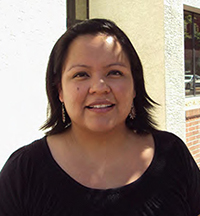 Why did you choose your specific health professional career?
Why did you choose your specific health professional career?
I chose my career because I enjoy working with the community. I’m passionate about learning from the community, being creative about developing program events, and determining whether the program has made a difference in their lives. I enjoy every aspect of public health.
What experiences did you have to make sure this profession was right for you?
I was an intern at two different environments serving as a health educator. It was an enjoyable experience. I decided to take some classes within the MPH program to determine whether I wanted to pursue an MPH. I was a non-degree seeking student for two semesters before I decided to apply to the program. After beginning the program, I decided public health was the path for me.
Describe any obstacles or barriers to success that you encountered along your health professional career path. How did you overcome them?
I don’t think this would be considered an obstacle or barrier, but it certainly was a challenge to complete my MPH while raising two children who were 6 and 11 years old when I started the MPH program. I had wanted more children at the time, but decided to hold off until after I received my degree. My plans took a turn for the best as my third child was born shortly before Thanksgiving break during the third semester of the program. I was determined to complete my final semester with my newborn in tow while working part-time at the Tucson Indian Center. It was by far the most difficult semester of my academic career. However, I completed my degree requirements and received my diploma. In my case, I overcame this challenge by constantly praying for strength, determination, and motivation. My family provided a great amount of support. My mother moved to Tucson from New Mexico to help provide care for the new baby and my sister also assisted in caring for my children. Another challenge was understanding the difference between being aggressive and assertive in all aspects of learning. This includes approaching your instructor and asking for assistance with writing in a less passive voice. As a Native American, I was taught to respect authority by listening, passive observation and limiting my questions. In this career path, I had to learn how to ask questions, ask for help, request explanations and write assertively. It was a constant balance because I felt like I would lose my native identity in this transition of learning. However, I learned it’s possible to go back to your tribal communities and draw upon those same teachings once again.
What do you do in your current job?
Currently, I am conducting a needs assessment for the Tucson Indian Center’s Tobacco Prevention Program. I’m also involved on other sub-committees that involve youth and employee empowerment.
What advice do you have for American Indian/Alaska Native students who are interested in health careers?
Dream about what you want to do. Think about that dream often because you will begin to strategize on how you will be able to accomplish that dream. That dream will eventually become a realistic goal. Take little steps to reach that goal. Be patient with the process because it does take time, but before you know it you will have already accomplished your goal. Also know that any challenges, barriers, or obstacles can be overcome. We are resilient and creative people with a gift to improvise.
What would you like to see for your tribe’s future?
I would like to see my tribe heal from the generational and historical trauma and oppression that manifests into homelessness, substance use/abuse, obesity, and other chronic conditions. I would also like to see us draw upon our own traditional ceremonies and foods that bring us healing. Lastly, I would like to see those who left the reservation to obtain an education to return and serve their people.
Do you practice traditional medicine? If you do, then how does traditional medicine interact with conventional medicine?
Traditional medicine has always been a part of my life. Traditional medicine allows me to take into consideration my physical, spiritual, emotional, and mental abilities when treating an illness. I believe herbs are a natural component of earth; a gift from the Creator. As a health professional, I do hesitate at times when I’ve been using both conventional medicine and traditional medicine because of the interaction it may cause. I use one or the other depending on the illness.

